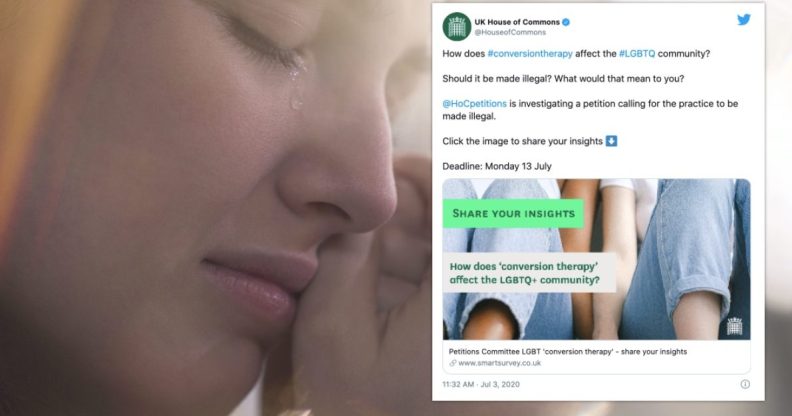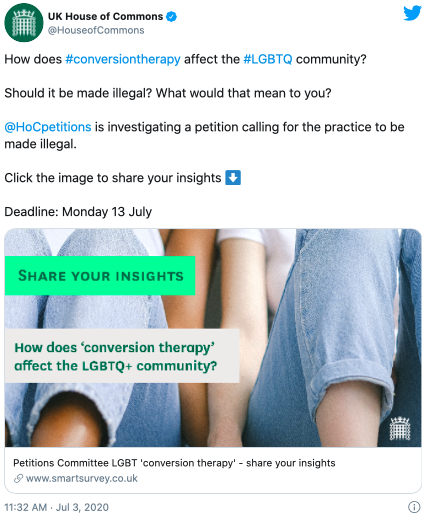House of Commons officials backtrack after launching survey on conversion therapy – two years after government promised a ban

The House of Commons, the lower house of the British Parliament, weathered criticism for its wording of a Petitions Committee survey asking if conversion therapy should be banned. (Stock photograph via Elements Envato)
A move by a House of Commons committee to launch a public survey into whether conversion therapy should be made illegal drew fierce criticism Friday (July 3).
In a since-deleted tweet, the House of Commons Petitions Committee announced it would be seeking public responses as to whether conversion therapy – a practice widely disputed and denounced by medical authorities and mental health groups – should be outlawed.
The committee invited citizens to comment on how the debased treatment “affects” LGBT+ people, whether it should be made a criminal offence and how the practice should be defined.

(Twitter)
The decision to launch a public survey on such a widely debunked practice – one which the government vowed to outlaw exactly two years ago as part of its LGBT Action Plan – became a lightning rod for criticism.
Academics, psychiatrists, queer faith leaders, LGBT+ partisan political groups and queer charity executives all expressed to PinkNews a feeling of frustration, amid the Tories’ lacklustre response in moving forward to finally ban conversion therapy.
“It is a sad sign of our times that the Government should feel the need to ask the public whether devastating conversion therapy for LGBTQ+ people should be made illegal,” a representative of the trans youth charity Mermaids said.
“History, fact, research, reason, kindness and common sense scream: Yes. Of course, it should.”
Of immediate concern to the group was that government officials must be mindful of trans lives when drafting the ban, “any effort to tell trans children and young people that they’re not trans”, they said, “must be made illegal”.
Laura Russell, head of policy at Stonewall, echoed this, dubbing the practice “unethical and wrong”.
“A person’s sexual orientation and gender identity is a natural, normal part of their identity and not something that can or should be changed,” she said.
“We’d urge the Government to hold true to their commitment to end this harmful practice, once and for all.”
Commons committee apologises for conversion therapy tweet.
The framing of conversion therapy as a debate is itself erosive to LGBT+ rights, said Dr Ben Colliver, who specialises in online interactions at Birmingham City University’s School of Social Sciences.
“The very framing of this issue as being ‘debatable’ contributes to a wider social climate in which it is acceptable to debate the right of minoritised groups to live freely,” he said. “On reflection, the House of Commons may want to consider why conversion therapy is still legal, rather than whether it should be.”
The House of Commons Petitions Committee told PinkNews that a public survey was launched in response to a petition filed to the House of Commons calling for a ban on conversion therapy tallied nearly 200,000 signatures was presented to the government.
British law requires Parliament to at least consider debating any petition that receives more than 100,000 signatures. The Petitions Committee can take various actions on e-petitions, one of which is to investigate the pivotal issue of the petition further.
The committee representative explained how, due to coronavirus pandemic regulations freezing Parliament, petition procedure in holding debates in Westminster Hall has been suspended.
They explained that lawmakers “did not make a specific commitment to making conversion therapy illegal” in response to the petition.
As a result of this, alongside the “strength of interest in the issue, the Petitions Committee launched a public survey to “further the conversation”.
“We apologise,” they said. “Our intention was to provide a platform for people to share their opinions on this subject with the Petitions Committee, and inform its case to the government.
“Clearly we misjudged this and have now deleted the tweet.” The survey has also been taken offline.
The decision to consider the opinions of the public in drafting legislation comes just weeks after the government, following years of uncertainty on the future of trans rights, allegedly moved to completely ignore public opinion on crucial reforms for the Gender Recognition Act, with reports suggesting that a massive public consultation on the matter will be ignored because too many trans people and allies responded.
Royal College of Psychiatrists condemn conversion therapy.
So-called gay conversion therapy is often compared to torture and has been linked to higher risks of depression, suicide, and drug addiction.
All major UK health organisations have denounced the practice as damaging pseudoscience, yet the cruel practice has remained untouched by government intervention. The National LGBT Government survey found two per cent of LGBT+ people have undergone conversion therapy, and a further five per cent have been offered it.
The British government pledged a ban two years ago, and on June 5 this year, following an inflamed, bi-partisan uproar, minister for equality Lizz Truss abruptly announced a ban will be announced “shortly”.
However, the celebration of the long-awaited move was brief and quickly muddled. Sources alleged that ministers are only suddenly moving ahead with the ban to “placate” the queer community after claims brewed that potentially life-saving reforms to gender legislation will be scrapped.
The president of the Royal College of Psychiatrists, the main professional organisation of psychiatrists in the UK, warned PinkNews that conversion therapy, also called reparative therapy, lacks discernible credibility.
“We oppose LGBT conversion therapy,” Dr Adrian James said.
“Any intervention purporting to ‘treat’ something which is not a disorder is wholly unethical and should be banned. Psychiatrists should be committed to reducing inequalities, not supporting practices that are explicitly based on pathologising LGBT individuals and their sexual orientation.
“We support calls to make such conversion therapies illegal,” he said, stressing that the college is considering the inequalities and discrimination faced by the LGBT+ folks as a “top priority”.
Truss has expressed unease at tackling the, at times, jumbled legality of a nationwide ban. In an almost laddered approach, she has often sought to emphasise her department’s aim to ban conversion therapy as a whole, which she called “vile and abhorrent“, but admitted there are complexities.
She noted that the ban would not collide with people seeking spiritual guidance from religious leaders in regards to their sexual orientation, but didn’t quite clarify whether the ban would be a wholesale regulation of psychotherapists and counsellors.
But prominent gay evangelical Jayne Ozanme implored Truss and her department to look to countries that have already installed bans as a blueprint for Britain to do the same, even while navigating religious belief.
“Whilst we continue to discuss this, lives – most often young lives – are being damaged and sadly even lost,” she said.

